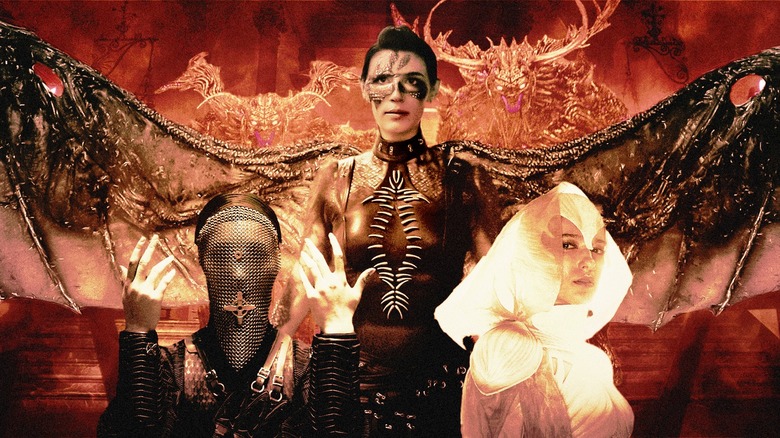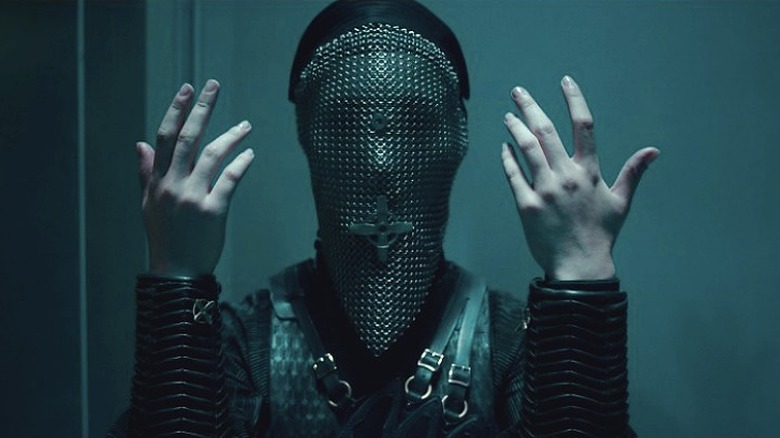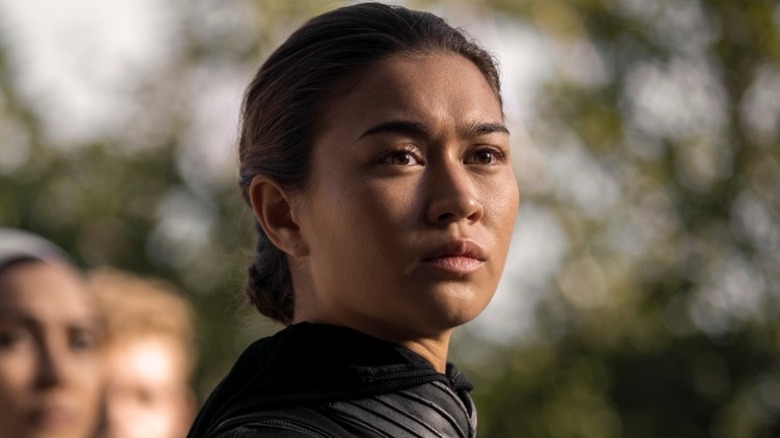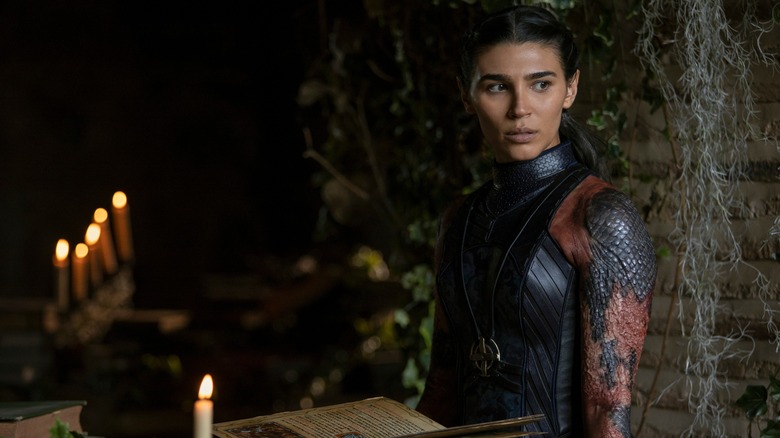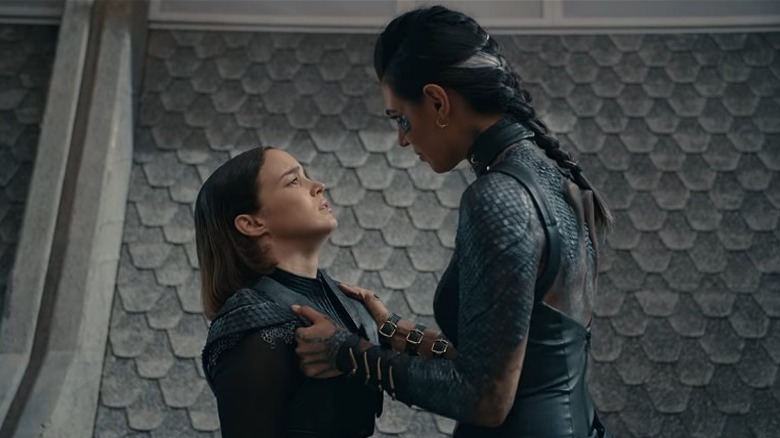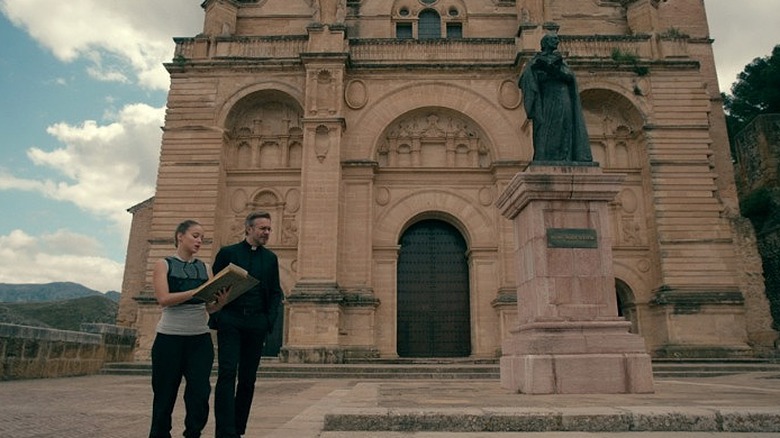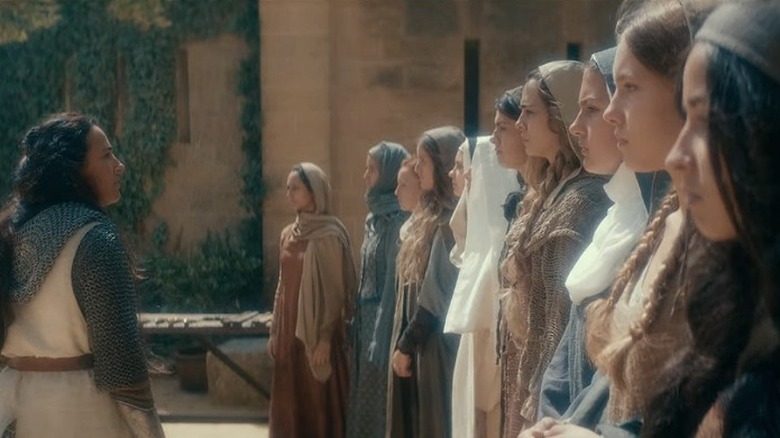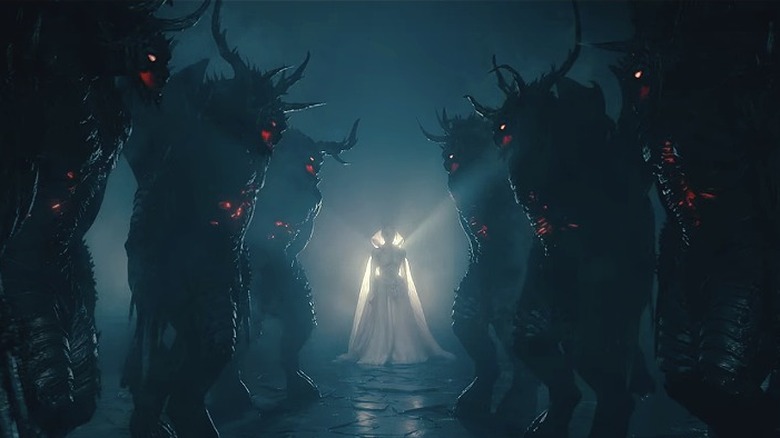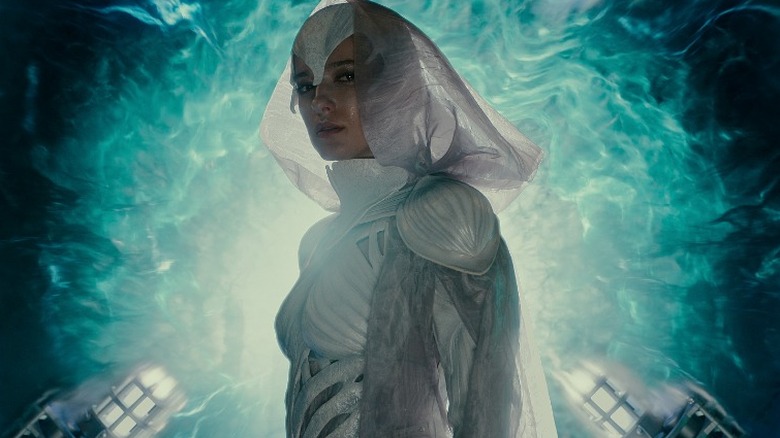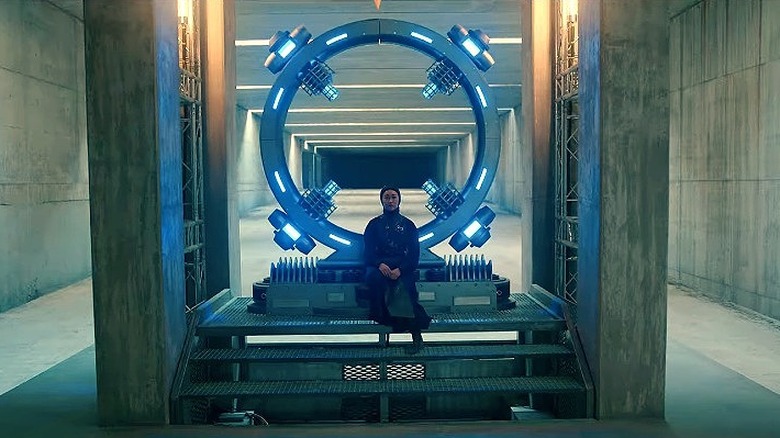The Storyline We Should Have Gotten In Warrior Nun Season 3 Before Its Unjust Cancelation
For reasons we may never know (money, it was money), Netflix chose not to give the widely beloved "Warrior Nun" a Season 3 renewal.
Since that means we're not going to actually see the story play out as intended, it's only fair that we analyze what happened in the first two seasons, and use their consistent use of historical, religious, and literary allusion to predict what Season 3 would (and should!) have been. Doing so will serve us well on this Season 3 prediction journey, and lead us not into pure fan-fiction.
To accomplish this, we'll be looking as much at the series' religious and historical reference points as we will at its thematic intent. To be clear, "Warrior Nun" speaks to viewers from all walks of life, so remember that any religious elements discussed herein are considered from a strictly narrative standpoint. In fact, since the brilliance of "Warrior Nun" was how it employed multiple mythologies and religions without promotion or rejection, it wouldn't make much sense for us to do things any differently in this Season 3 projection.
While we could spend hours Da Vinci Coding every last clue buried in Simon Barry's series, we'll instead focus on those that speak directly to the series' overarching questions, including: what are the fundamental natures of both (BIG picture) truth and faith? Are they in conflict? And are there limits to the respective human benefit or viability of either? Also, is faith a benevolent force made malevolent by mankind's need to control and suppress others, or a construct born of that need? Finally, what aspect of these potential truths have been lost, misinterpreted, or intentionally manipulated for ulterior motives over millennia ... and to what end?
Pretty straightforward, yeah? Great, let's do this.
Will the real Beatrice please stand up in Warrior Nun Season 3?
"Warrior Nun" is littered with references, from the obvious (e.g., its episode titles) to the not-so-obvious. Character names fall into both these categories, and while some are straightforward (see: Padre Pious Welter) others demand further investigation, including the linguistically-gifted badass Beatrice (Kristina Tonteri-Young).
It's a name with no shortage of potential inspirations, from Beatrice of England — who like our Beatrice, was the daughter of British "VIPs" — to Beatrice Portinari, Dante's unattainable muse. And although the most obvious "Bea" is Saint Beatrice, patron saint of prisoners, there's something about Beatrice as a distinctly Christian saint that feels, well, a little too easy, unless we consider two additional Beatrices: Beatrice of Provence — home of the fearsome, mythological Tarasque (sound familiar?) — and the medieval trobairitz (or, woman troubadour) Bieiris de Romans, also known as Beatriz/Countess Beatrice.
Bieiris de Romans' "Na Maria, pretz e fina valors" has ignited academic debate for decades. The lyrical poem's overtly romantic language — written by a woman about and to another woman — has been a real point of contention for scholars who reject it as an expression of same-sex longing. Some have attempted to deny its female authorship, while others insist its language is anything but romantic (per UNC Chapel Hill's "Romance Notes"). Scholarly interpretations notwithstanding, the plot of "Na Maria" as it relates to Beatrice's love for Ava (Alba Baptista) feels like the missing puzzle piece. In it, the speaker begs Maria not to give her love to a deceptive wooer. Since Ava has given everything — including, potentially, her life — to a mission we trust less and less with each episode, this notion of devoting oneself to something "false" seems ready to play out in Season 3.
Beatrice's mandatory un-retirement in Season 3 of Warrior Nun
Of this we can be certain: Season 3 would see Beatrice interrupted on her journey of self-discovery by good 'ol mandatory unretirement. How else to bring her back into the fold? Whether it's a fresh uptick in "demons," a sign that Ava might be trying to communicate from the other realm, a run-in with a Tarask, or news that her sisters and/or humanity are in peril, let's assume that she packs up and reluctantly heads back to The Cradle. "Warrior Nun" typically gives us a voiceover recap of off-screen events at the start of a new season, but instead of Ava's voice, we'd likely be granted entry to the third installment through either (or both) Beatrice's and Lilith's (Lorena Andrea) perspective.
Ah, Lilith — the newly-winged, on-again-off-again antagonist of Seasons 1 and 2. There's a few directions Season 3 could take her in, and like Beatrice, her name and narrative thus far will help us navigate them.
You might be familiar with the exhaustively-debated notion of Lilith as Adam's first wife, or, the "first" (unnamed) woman mentioned in Genesis, who's very much implied to be Adam's equal. Genesis Chapter 2 gives us a name (Eve), and since she's made not of clay, but from Adam's rib, she's often been interpreted as subservient to him (and thus, by some, as being a different woman entirely). Early church leaders sought to resolve this contradiction by giving the unnamed woman the name Lilith, and positing her as a kind of "too independent" proto-wife, who was either cast out of or simply left the garden because of that independence, as historian Bettany Hughes explores in "Daughters of Eve." But let's dive deeper into how all this impacts the character of Lilith's "Warrior Nun" path.
Lilith knows something we don't know
Again, Genesis itself doesn't really imply any of this, and many scholars believe that what appears to be two different women is merely the result of the same story coming from different scribes. At any rate, Lilith's journey from pagan demon, to Adam's unnamed ex-wife, to an accidental redundancy, to the feminist icon and namesake of Lilith Fair ... is a long and winding road, so for time's sake, we'll skip to what this means for our Lilith.
The concept of Lilith as an outcast-turned-icon seems the most in-keeping with the ethos of "Warrior Nun," so it's safe to assume that in Season 3, our Lilith has been, and will be, similarly misunderstood and rejected for her refusal to fall in line. For all the OCS's abject badassery, the series never lets us forget that these warriors fight in the name of an ostensibly male god, and take their orders from powerful men ("All the heroes are women," Ava says in Season 1, "but the cake-topper is a dude"). It wants us to remember this "Charlie's Angels" set-up, and to add it to our list of things that make the warriors' entire mission suspect. And while the series has yet to fully expose that mission, by the end of Season 2, of this we can be certain: Lilith knows something we don't.
When Adriel (William Miller) asks Lilith what happened to her on the other side, she says she doesn't remember, but her body language says otherwise, and a closer inspection of her actions in "Warrior Nun" Season 2 reiterate her possession of secret knowledge — another intentional callback to the Bible, most likely.
What would Lillth do in Warrior Nun Season 3, though?
"Adriel likes you," Lilith tells Ava in one key moment of Season 2, adding, "that's why he hasn't killed you yet."
This isn't true, however. In fact, Adriel does try to kill Ava, so we know that's not right. It's Lilith who doesn't want Ava dead (and who, in fact, tells Beatrice how to heal her, perhaps because she needed Ava to enter the other realm all along), and it's also Lilith who steps in between Ava and Adriel on multiple occasions. Also, note how Lilith is the one who tells Beatrice of the impending holy war, and the only place she could have obtained this information is during her supposedly "forgotten" time in the other realm.
Here's something else we know: Lilith will knowingly anger those she loves to do what she believes is right. She even tries to stop Ava from unwittingly freeing Adriel in Season 1, much to the chagrin of her sisters. It all points to the Season 3 revelation (lower case r) that Lilith has, at least from one perspective, good intentions, and was merely using Adriel to further her own agenda.
Lilith's desire to break free both drives her actions and extends not just to her sisters, but to anyone she sees as oppressed by the use of knowledge hoarding and manipulation as a means of control. Lilith might simply be fighting to provide another option — a veil-lifting that sees truth and knowledge as sacred, and religious institutions (though not necessarily religion) as standing in the way of these things. However, Lilith isn't the only one who knows something we don't.
Semantics return in Season 3 of Warrior Nun
Meena Rayann's Yasmine Amunet — whose Egyptian mother-goddess last name means "the hidden one" — is likely the mole who betrayed the OCS to Adriel (she sure seems to get in their way a lot, through an endearing but potentially feigned ineptitude). Nonetheless, it's clear she cares about her newfound family, and like so many of the show's more mysterious characters, we can assume her motivations are complex and potentially justified. At the very least, it's unlikely they're intentionally nefarious.
Then, of course, there's our very first warrior nun, Areala of Cordoba (Guiomar Alonso), and her continually evolving, unreliable flashbacks. Despite their unreliability and continued manipulation, there's a lot we can deduce from this figure and her "history." A major theme in "Warrior Nun" is its frequent questioning of the line between the reality of what happened, and the politically-driven revision thereof. Areala's story rests at the intersection of these dueling narratives, and points to some major Season 3 reveals.
Let's begin at the beginning. Given the tone and subtext of "Warrior Nun" as a whole, the handful of Areala flashbacks can't possible be the last we'll hear of the crusades, and the semantics at play in Ava's reading of Areala's history echo this: she "fought in his name," the history reads (and Ava stresses the "his"), but it doesn't necessarily follow that we know who "he" is, or what Areala fought for. Considering how reality contrasts with the toxic mythology of the crusades (recently reignited, per Time), it's hard to believe that the show's ancestral hero figure would buy Pope Urban II's hateful propaganda, or endorse such transparently political bloodshed.
"You lie like a man," she tells Adriel — a line that says much about who she'd be willing to take orders from.
And Areala returns, as well
Importantly, the landmark Areala and her knights approach in the initial flashback is Almodóvar Castle, located near Córdoba. We can assume that Areala's story is tied not to crusaders in Jerusalem, but to the complex, multi-cultural history and composition of the Iberian peninsula in the 11th century.
We'll avoid trying to "sum up" centuries of intricate political and cultural conflict and cooperation and simply say this: if she'd grown up anywhere near Córdoba, Areala would undoubtedly have seen how the once prosperous region had benefited from religious tolerance (per The Met Museum), and crumbled with the rise of such factors as political in-fighting, to power struggles within the same religion, to more widespread religious persecution (per BBC). The tug of war in this period was complex (to say the absolute least), and saw the still-debated concept of Convivencia — that is, the practical coexistence of the region's Jews, Muslims, and Christians — overtaken by its violent alternative: a destructive intolerance that would plague the region for centuries.
Yes, Areala could have been (like Saint Aura of Córdoba/Seville before her) a Christian. But for all we know, she could also have been Muslim, Jewish, or an Andalusian Christian persecuted by "reformist" Christians (per "The Ornament of the World"). It can't be an accident of costume design that the women she gathers in the flashback are wearing a range of medieval religious attire. Is it possible she created the order not to fight in the name of any one religion, but to fight for the peaceful coexistence of many?
If so, a Season 4 exploration of the paradox of fighting for peace seems inevitable, but let's tackle one imaginary season at a time.
Reya's roots reveal much in Season 3 of Warrior Nun
When "Warrior Nun" introduced Reya (Andrea Tivadar), it opened up a whole new can of worms. But if we focus on what the series has been trying to promote thus far — and combine this with one last Name Game — we can chip away at what she might represent.
Yet again, Reya's name has a variety of potential inspirations, including: Greek mythology's Rhea, the mother of the gods; Asherah, the consort of the ancient West Semetic god El, and another mother of gods; and the Scandinavian goddess Freyja. Relevantly — since it speaks to the "Warrior Nun" focus on interpretation — some scholars believe Asherah was once also worshipped as Yahweh's consort (via William J. Dever), or as the feminine component of god's genderless/transcending nature (per BBC). As for the Greek Reah, like Reya, she had a troop of demonic-looking creatures doing her bidding on Earth — The Kouretes — who protected her son Zeus from his cannibal father Kronos after Reah hid the infant in a cave on Mount Ida (not unlike Reya's protection of Jack Mullarkey's Michael).
Which brings us to Freya (or Freyja), the Norse goddess of not just fertility and love, but battle and death as well (she even takes half the soldiers who die in battle to her Great Hall, Fólkvangar, Odin's Valhalla be damned). Though her origins and conflations with other goddesses are fairly convoluted, she's often linked, like Frigg, to the Proto-Germanic mother-god Frija (for those keeping score, that's the fourth mother-god who's come up), and her connection to mysterious and powerful objects — including the necklace Brísingamen, which is stolen and re-obtained from Loki — is yet another "Reyan" throughline.
Now, here's what all this means with regard to Reya and Season 3.
This helps Warrior Nun Season 3 maintain its ethos
While it's not a huge leap from stolen necklace to stolen halo, we're not suggesting that a third season of "Warrior Nun" would veer off into "Ragnarok" territory, or that it would reimagine any singular version of these stories. These mother-god connections, however, feel less like a Joseph Campbell pile-up, and more like a collective, intentional nod to an ultimate reveal:
If Reya is indeed an all-powerful mother-god — who, like the goddesses mentioned herein, isn't good or bad, but simply "is," as Michael says — she might be the unintentional origin of the gods, and God, at the center of both polytheistic belief systems — and the Abrahamic religions as well. We know her realm isn't the heaven or afterlife of anyone's faith, and that Adriel only uses terms like "angel" and "prophet" because they have meaning for humans. It's possible that multiple beings from Reya's realm broke through into ours at various points and in various places throughout human history, and for obvious reasons, this led to them being worshiped as deities.
Importantly, this doesn't negate the idea that they then stuck around and lived up to their assumed role. Thus, such a reveal would allow "Warrior Nun" to avoid deriding, denying, or contradicting anyone's faith (since, if anything, it would support their respective origins), while at the same time allowing it to condemn — as it so consistently has — the many ways in which faith can be manipulated in our realm to control and subjugate others and justify hate.
Which brings us back to Beatrice...
Death and revelation in Season 3 of Warrior Nun
Surely, Season 3 would see Beatrice struggle to resolve her faith following the events of Season 2, like a kind of avatar for the series' own struggle to resolve science with the characters' beliefs. Much has been said about the ambiguity of "Warrior Nun," as if it's either unaware that it isn't answering the questions it poses, or afraid to give a conclusive answer. Interestingly enough, alien invasion stories don't garner this specific criticism, despite the fact that they are, by necessity, asking similar questions about humanity without answering them. And if we think of "Warrior Nun" as the alien invasion story it very much is, the endgame becomes clearer.
Unfortunately for "Avatrice" shippers, Ava will have to die (for real this time), and not just because Happily Ever After makes for extraordinarily boring television. Ava's death would prompt Beatrice to return the OCS to its original purpose — that is, challenging those who would use faith and knowledge as a weapon to gain power (demon puppeteers included).
This might not work for critics who think "resolution" means providing trite and tidy answers and conclusions to every minor plot thread, but it would reveal a (frankly, more important) thesis: that is, that truth (again, BIG picture truth) isn't a zero-sum game, and isn't in conflict with any one faith. Rather, it's the greed-fueled games mankind plays with these things that stand in the way of intellectual and spiritual freedom.
In the end, the ideology of "Warrior Nun" turns out to be far simpler than its complex narrative suggests: "Be free," Beatrice tells Ava at the end of Season 2. It's a sentiment meant as much for the viewer — and for humanity as a whole — as it is for Beatrice and Ava.
